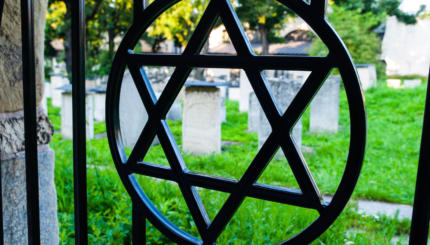The suicide of a loved one is among the most challenging tragedies a person can face. In addition to the sudden loss, mourners often grapple with feelings of anger and guilt toward the deceased. In addition, there remains a stigma attached to suicide in many parts of the Jewish community born of the fact that Jewish tradition is deeply opposed to the taking of one’s own life in nearly all cases.
Is suicide against Jewish law?
While there is no explicit biblical prohibition on suicide, later rabbinic authorities derived a prohibition from the verse in Genesis 9:5, “And surely your blood of your lives, will I require.” Rashi and other early rabbinic authorities understood the verse as a prohibition against taking one’s own life. Contemporary rulings from all three major religious streams have upheld the view that suicide is fundamentally incompatible with Jewish law and values.
Preserving human life is among the highest duties in Judaism, and suicide is seen as counter to this fundamental value. Human beings are barred even from harming themselves — let alone ending their own lives. Moreover, in traditional Jewish thought, the body belongs to God, and as such ending one’s life not considered within the scope of a person’s authority. Suicide is sometimes regarded as stealing from God and a rejection of God’s sovereignty. The only exception is in cases of martyrdom, where Jews are traditionally obliged to sacrifice their lives rather than violate the three cardinal sins of idolatry, murder and sexual immorality. However, the Jewish legal standard for suicide requires that a person be of sound mind, a standard that many contemporary rabbis believe disqualifies those who take their own lives as a result of mental illness, a category that includes severe depression and bipolar disorder.
Can a person who committed suicide be buried in a Jewish cemetery?
Yes, in most cases. Although traditional Jewish law rules that mourning rites should not be observed for those who take their own lives, most contemporary rabbis look for any basis on which to disqualify an apparent suicide so as to allow for traditional burial.
With your help, My Jewish Learning can provide endless opportunities for learning, connection and discovery.
The Shulhan Arukh writes of a suicide: “We do not mourn for him, or eulogize for him, or tear our clothing for him, or remove shoes for him. We only stand for him on a line and say the blessing of mourners for him, and any other thing that is respectful for the living.” As a result, it was once common practice to bury suicides outside the cemetery gates or in a special section. But because the ancient rabbis established a high bar for what was legally considered a suicide, there are various grounds on which contemporary authorities could make the case that someone who took their own life doesn’t meet the standards for suicide established in Jewish law.
Only someone who killed themselves knowingly — in Hebrew lada’at, essentially someone of sound mind — is considered in Jewish law to have committed suicide. The Shulhan Arukh states that a case qualifies as a suicide if the person who died was angry or in distress and announced his or her intention to go up to the roof for the purpose of taking their own life. In addition, an adult isn’t considered to have committed suicide if he or she acted out of compulsion — the cited example being the biblical King Saul, who killed himself rather than face torture or forced conversion at the hands of the Philistines An opinion attributed to the medieval authority Rabbenu Asher (the provenance of this opinion is widely disputed) states that traditional burial should not be denied to someone who commits suicide due to “a multiplicity of troubles, worries, pain, or utter poverty.”
All of this provides considerable latitude for religious authorities to find grounds for providing burial rites to Jews who take their own lives — even in situations where law enforcement authorities have identified the death as a suicide.
Aren’t some ancient Jewish suicides celebrated?
Yes. Perhaps most famously, the Jews who occupied the fortress of Masada are believed to have committed mass suicide rather than surrender to the Romans. Jews have traditionally venerated these and other historical figures for their bravery and self-sacrifice, but the legal standing of their actions is less clear.
What about assisted suicide for the terminally ill?
Suicide is not permitted even in cases when a person is terminally ill or in significant pain. Similarly, helping a terminally ill individual commit suicide is also not allowed, and may in some cases be tantamount to murder. Orthodox, Conservative and Reform authorities have all upheld the ban on euthanasia, though some prominent Reform rabbis have more recently questioned that prohibition.
Jewish authorities are more lenient when it comes to withdrawing critical care that might artificially extend a person’s life. The Shulhan Arukh rules that impediments to the passage of the soul can be removed so as to allow death to proceed. There is also broad support for alleviating the pain and suffering of those nearing death, even in cases where such measures risk hastening the patient’s demise. Orthodox, Conservative and Reform rabbis have all expressed support for morphine drips for the terminally ill — even at the risk of inducing cardiac arrest or decreased respiration. Given the morally fraught issues involved, families are often encouraged to consult with trusted rabbinic authorities when making such decisions.
Are there any Jewish suicide prevention resources?
Elijah’s Journey appears to be the only American Jewish nonprofit organization focusing exclusively on suicide prevention. However, many local Jewish Family Service groups provide counseling services for those struggling with depression and support groups for people who have lost a loved one to suicide. A number of national organizations can provide immediate assistance to someone struggling with suicidal thoughts.
Did we overlook a Jewish resource for suicide prevention or for people who have lost a loved one to suicide? Please email us at community@myjewishlearning.com.
Sign up for a Journey Through Grief & Mourning: Whether you have lost a loved one recently or just want to learn the basics of Jewish mourning rituals, this 8-part email series will guide you through everything you need to know and help you feel supported and comforted at a difficult time.
Looking for a way to say Mourner’s Kaddish in a minyan? My Jewish Learning’s daily online minyan gives mourners and others an opportunity to say Kaddish in community and learn from leading rabbis.



